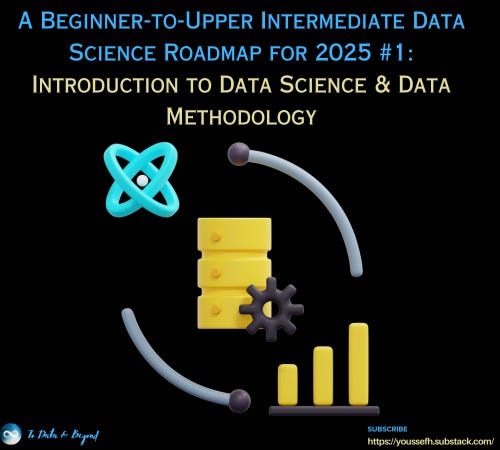A Beginner-to-Upper Intermediate Data Science Roadmap for 2025 #1: Intro to Data Science & Data Methodology
A Step-by-Step Roadmap to Start a Data Science Career In 2025
Whether you’re a recent graduate or a professional looking to make a career change, the field of Data Science and AI offers a wide range of exciting and lucrative opportunities.
In this series of articles, I will provide you with a comprehensive guide that will provide you with a clear and actionable plan for building the skills and knowledge you need to succeed in this growing field. By following the steps outlined in this roadmap, you’ll be well on your way to a successful and rewarding career in Data Science & AI.
This roadmap will take you to an upper intermediate level, and I truly believe you can land a job and start your career after finishing it. However, to go to an advanced level, you will need to take more in-depth courses, books, and research papers.
For each learning step, there will be compulsory material, optional material, and action points to make sure you put what you have learned into action. Also, there will be an estimated time for each of the learning resources in hours so you can calculate the time needed to finish this roadmap depending on your pace.
In the first article of this series, you will be introduced to data science and data science project life cycle. In addition to that you will be introduced to basic business concepts essential for data science.
This article is the first in the ongoing series of A Beginner-to-Upper Intermediate Data Science Roadmap for 2025:
Introduction to Data Science & Data Methodology (You are Here!)
Mathematics for Data Science (Coming Soon!)
Software Engineering Basics (Coming Soon!)
Python Fundamentals & Python for Data Science (Coming Soon!)
Database & SQL (Coming Soon!)
Data Cleaning & Preprocessing (Coming Soon!)
Feature Engineering (Coming Soon!)
Mastering Machine Learning (Coming Soon!)
Deep Learning Fundamentals (Coming Soon!)
Generative AI & Large Language Models (LLMs) Fundamentals (Coming Soon!)
Machine Learning Operations (MLOps) (Coming Soon!)
Building Your Data Science Portfolio (Coming Soon!)
Getting Ready for the Market (Coming Soon!)
Table of Contents:
What is Data Science?
Data Science Methodology
Data Science for Business Innovation
5 Business Basics for Data Scientists
Optional Resources
Action Points
My New E-Book: LLM Roadmap from Beginner to Advanced Level
I am pleased to announce that I have published my new ebook LLM Roadmap from Beginner to Advanced Level. This ebook will provide all the resources you need to start your journey towards mastering LLMs.
1. What is Data Science?
The first resource on this list is What is Data Science? by IBM available on Coursera. In today’s world, we use Data Science to find patterns in data and make meaningful, data-driven conclusions and predictions.
This course is for everyone and teaches concepts like how data scientists use machine learning and deep learning and how companies apply data science in business. You will meet several data scientists, who will share their insights and experiences in data science. By taking this introductory course, you will begin your journey into this thriving field.
The course consists of four modules:
Defining Data Science and What Data Scientists Do
Data Science Topics Module
Applications and Careers in Data Science
Data Literacy for Data Science
Resource Information:
Cost: 40$ (Financial aid available)
Course Provider: IBM & Coursera
Duration: 10 Hours
Instructor: Alex Aklson & Rav Ahuja
2. Data Science Methodology
The second resource on this list is the Data Science Methodology course by IBM on coursera. In this course, you will learn and then apply this methodology that you can use to tackle any Data Science scenario.
You’ll explore two notable data science methodologies, Foundational Data Science Methodology, and the six-stage CRISP-DM data science methodology, and learn how to apply these data science methodologies. Most established data scientists follow these or similar methodologies for solving data science problems.
Begin by learning about forming the business/research problem Learn how data scientists obtain, prepare, and analyze data. Discover how applying data science methodology practices helps ensure that the data used for problem-solving is relevant and properly manipulated to address the question.
Next, learn about building the data model, deploying that model, data storytelling, and obtaining feedback You’ll think like a data scientist and develop your data science methodology skills using a real-world inspired scenario through progressive labs hosted within Jupyter Notebooks and using Python.
The course consists of four modules:
From Problem to Approach and From Requirements to Collection
From Understanding to Preparation and From Modeling to Evaluation
From Deployment to Feedback and Final Evaluation
Final Project and Assessment
Resource Information:
Cost: 40$ (Financial aid available)
Course Provider: IBM & Coursera
Duration: 15 Hours
Instructor: Alex Aklson & Polong Lin
Keep reading with a 7-day free trial
Subscribe to To Data & Beyond to keep reading this post and get 7 days of free access to the full post archives.





